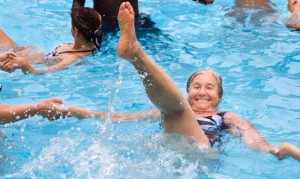 We know that exercise yields health benefits and lowers the risk of disease. But there is new evidence that exercising as a young adult can improve your cognitive skills later in life.
We know that exercise yields health benefits and lowers the risk of disease. But there is new evidence that exercising as a young adult can improve your cognitive skills later in life.
A new longitudinal study, the Coronary Artery Risk Development in Young Adults, included more than 2,500 women and men ages 18-30 during the mid 1980s, and then followed them for 25 years.
When the study began, researchers assessed the participants’ health with a variety of tests, including measuring their blood pressure and cholesterol. Then the participants were asked to walk, and then run on a treadmill, as researchers increased the speed until they could go no farther.
Twenty-five years later, the participants, now ages 43 to 54, repeated the treadmill test. This time, they followed the activity with cognitive tests to measure their memories and decision-making skills. For example, they were asked to remember lists of words.
On average, participants who lasted the longest on the treadmill test as young adults performed best on the cognitive tests later in life. For every additional minute that participants have been able to run as young adults, cognitive tests measured their brain function at about one year younger. In the long run, these types of small differences in cognitive tests correlate with a reduced risk for developing dementia later in life.
The take-home message: Even when you feel young and healthy, exercise is an important factor that contributes to your health later in life.
Does this feel like a depressing message for people who are already in their middle and later years? Not to worry. Researchers also found that participants who improve their fitness from their younger years to middle age performed better on cognitive tests than participants whose fitness declines.
The real take-home message? Exercise is important at any age.



Speak Your Mind